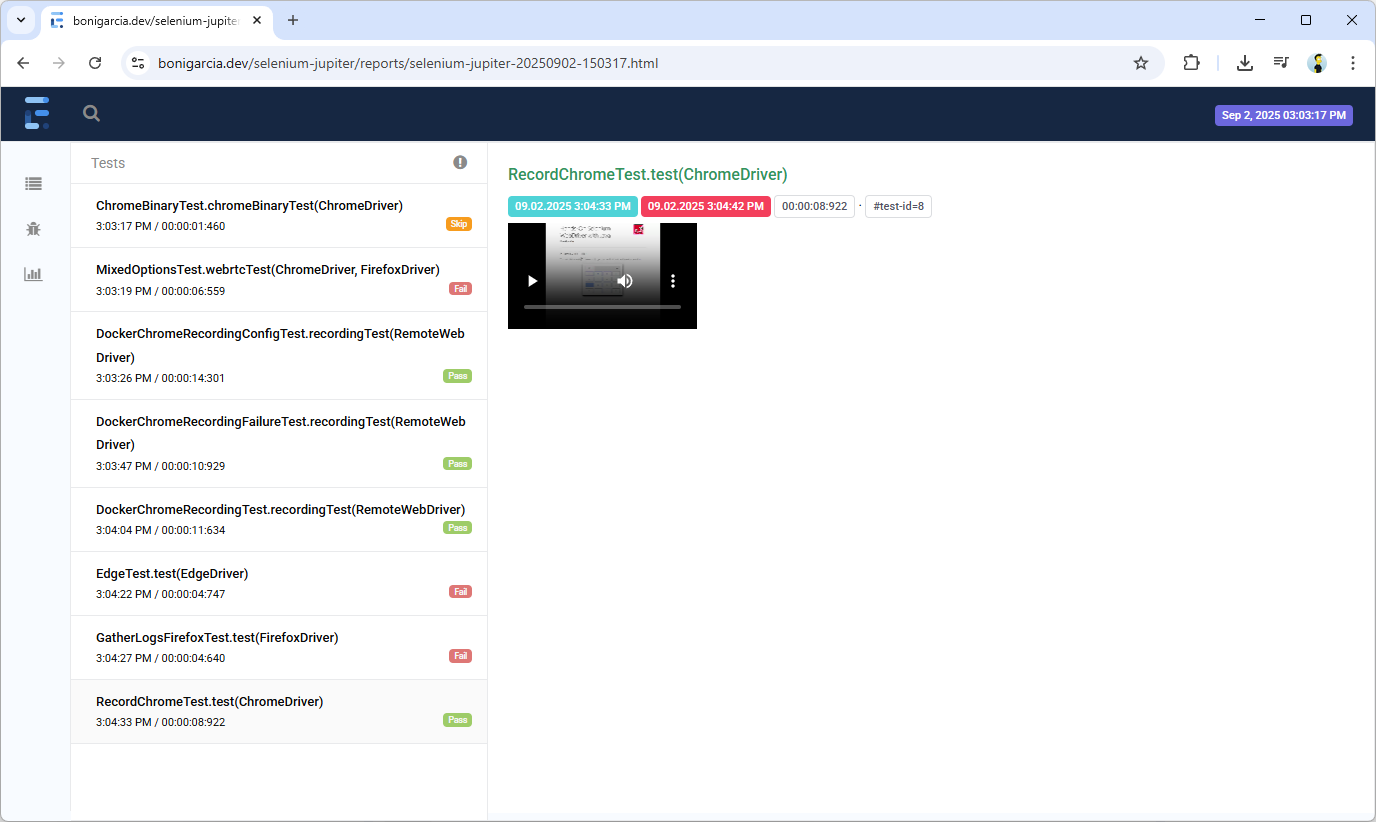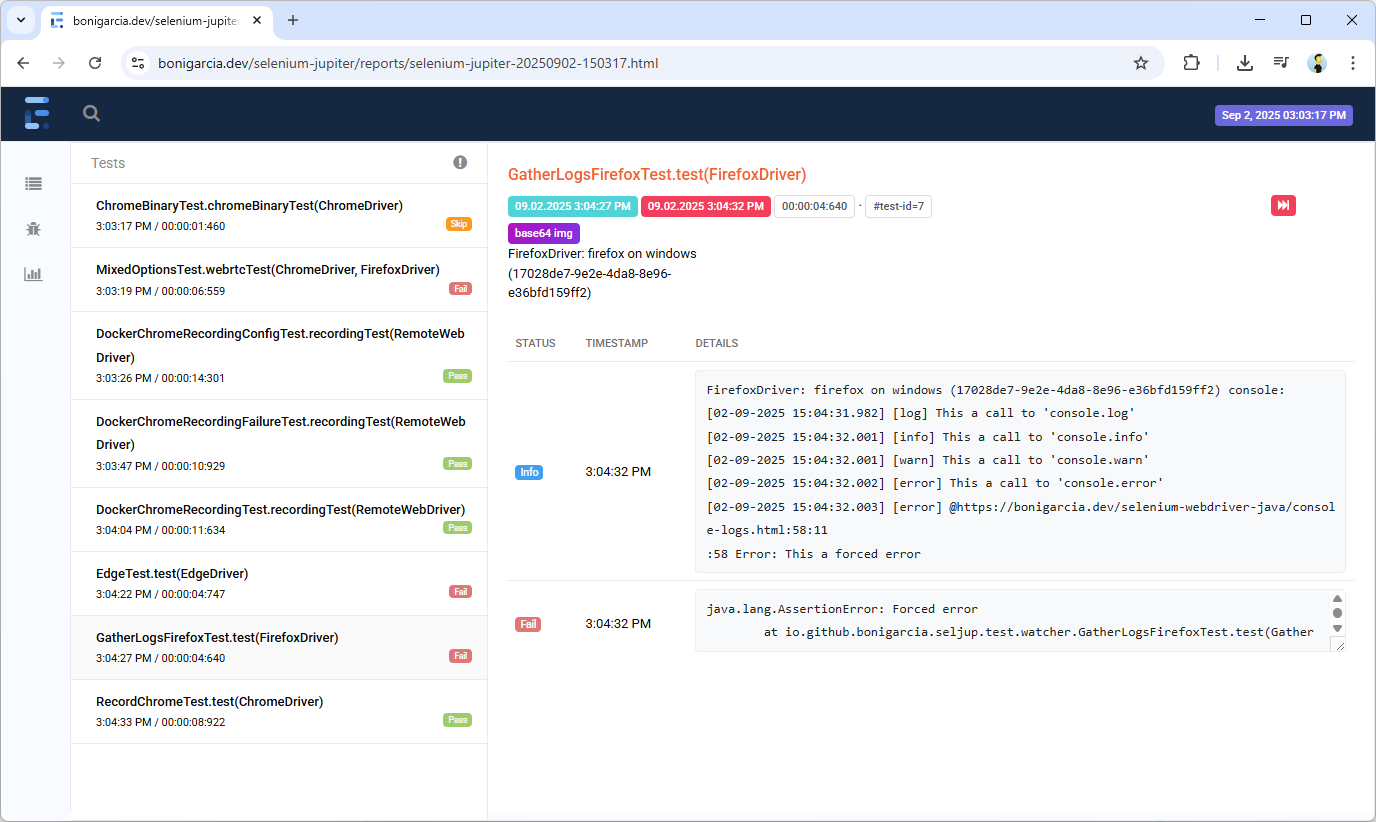Selenium-Jupiter is an open-source Java library that implements a JUnit 5 extension for developing Selenium WebDriver tests. Selenium-Jupiter uses several features of the Jupiter extension (such as parameters resolution, test templates, or conditional test execution). Thanks to this, the resulting Selenium-Jupiter tests follow a minimalist approach (i.e., the required boilerplate code for WebDriver is reduced) while providing a wide range of advanced features for end-to-end testing.
You can find the complete documentation of Selenium-Jupiter here. This site contains all the features, examples, and configuration capabilities of Selenium-Jupiter.
Selenium-Jupiter can be used to control local browsers programmatically using Selenium WebDriver. To do that, we need to specify the flavor of the browser to be used by declaring WebDriver parameters in tests or constructors. For instance, we declare a ChromeDriver parameter to use Chrome, FirefoxDriver for Firefox, and so on. For instance:
import static org.assertj.core.api.Assertions.assertThat;
import org.junit.jupiter.api.Test;
import org.junit.jupiter.api.extension.ExtendWith;
import org.openqa.selenium.chrome.ChromeDriver;
import io.github.bonigarcia.seljup.SeleniumJupiter;
@ExtendWith(SeleniumJupiter.class)
class ChromeTest {
@Test
void test(ChromeDriver driver) {
driver.get("https://bonigarcia.dev/selenium-webdriver-java/");
assertThat(driver.getTitle()).contains("Selenium WebDriver");
}
}Internally, Selenium-Jupiter uses WebDriverManager to manage the WebDriver binaries (i.e., chromedriver, geckodriver, etc.) required to use local browsers.
Selenium-Jupiter allows using browsers in Docker containers very easily. The only requirement is to get installed Docker Engine in the machine running the tests. The following example shows a test using this feature. Internally, it pulls the image from Docker Hub, starts the container, and instantiates the WebDriver object to use it. This example also enables the recording of the browser session and remote access using noVNC:
import static io.github.bonigarcia.seljup.BrowserType.CHROME;
import static org.assertj.core.api.Assertions.assertThat;
import org.junit.jupiter.api.Test;
import org.junit.jupiter.api.extension.ExtendWith;
import org.openqa.selenium.WebDriver;
import io.github.bonigarcia.seljup.DockerBrowser;
import io.github.bonigarcia.seljup.SeleniumJupiter;
@ExtendWith(SeleniumJupiter.class)
class DockerChromeTest {
@Test
void testChrome(@DockerBrowser(type = CHROME) WebDriver driver) {
driver.get("https://bonigarcia.dev/selenium-webdriver-java/");
assertThat(driver.getTitle()).contains("Selenium WebDriver");
}
}Selenium-Jupiter provides the class-level annotation @EnabledIfBrowserAvailable to skip tests conditionally depending on the availability of local browsers. For example:
import static io.github.bonigarcia.seljup.Browser.SAFARI;
import static org.assertj.core.api.Assertions.assertThat;
import org.junit.jupiter.api.Test;
import org.junit.jupiter.api.extension.ExtendWith;
import org.openqa.selenium.safari.SafariDriver;
import io.github.bonigarcia.seljup.EnabledIfBrowserAvailable;
import io.github.bonigarcia.seljup.SeleniumJupiter;
@EnabledIfBrowserAvailable(SAFARI)
@ExtendWith(SeleniumJupiter.class)
class SafariTest {
@Test
void test(SafariDriver driver) {
driver.get("https://bonigarcia.dev/selenium-webdriver-java/");
assertThat(driver.getTitle()).contains("Selenium WebDriver");
}
}Test templates are a special kind of test in which the same test logic is executed several times according to some custom data. In Selenium-Jupiter, the data to feed a test template is referred to as the browser scenario (a JSON file by default).
import static org.assertj.core.api.Assertions.assertThat;
import org.junit.jupiter.api.TestTemplate;
import org.junit.jupiter.api.extension.ExtendWith;
import org.openqa.selenium.WebDriver;
import io.github.bonigarcia.seljup.SeleniumJupiter;
@ExtendWith(SeleniumJupiter.class)
class TemplateTest {
@TestTemplate
void templateTest(WebDriver driver) {
driver.get("https://bonigarcia.dev/selenium-webdriver-java/");
assertThat(driver.getTitle()).contains("Selenium WebDriver");
}
}... and the browser scenario is:
{
"browsers": [
[
{
"type": "chrome-in-docker",
"version": "latest"
}
],
[
{
"type": "chrome-in-docker",
"version": "latest-1"
}
],
[
{
"type": "chrome-in-docker",
"version": "beta"
}
],
[
{
"type": "chrome-in-docker",
"version": "dev"
}
]
]
}As of version 6.3.0, Selenium-Jupiter provides built-in reporting capabilities through ExtentReports. This feature is enabled out of the box. All the tests executed with Selenium-Jupiter in the same suite will be reported (passed, skipped, failed) in a single HTML report per test suite execution. In addition, all the video recordings, both using @DockerBrowser and @Watch, will be gathered by Selenium-Jupiter and added to the resulting report (internally, the videos are encoded as Base64 in the HTML report), for example:
Finally, when a test fails, Selenium-Jupiter will gather two troubleshooting resources from the browser. First, it will try to take a screenshot of the browser (if it is still available). Second, it will try to gather the browser console logs, if possible. The screenshot(s) and the log(s) are automatically added for failed tests, for example:
You can find a complete HTML report example in this link.
Selenium-Jupiter is part of OpenCollective, an online funding platform for open and transparent communities. You can support the project by contributing as a backer (i.e., a personal donation or recurring contribution) or as a sponsor (i.e., a recurring contribution by a company).
Alternatively, you can acknowledge my work by buying me a coffee:
Selenium-Jupiter (Copyright © 2017-2024) is a project created and maintained by [Boni García] and licensed under the terms of the Apache 2.0 License.








